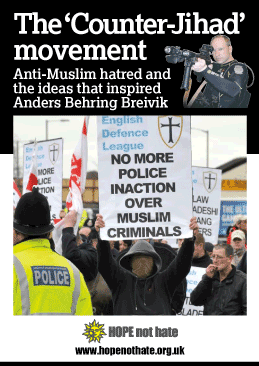 The international network of counter-jihadist groups that inspired Anders Behring Breivik is growing in reach and influence, according to a report released on the eve of the Norwegian’s trial.
The international network of counter-jihadist groups that inspired Anders Behring Breivik is growing in reach and influence, according to a report released on the eve of the Norwegian’s trial.
Far-right organisations are becoming more cohesive as they forge alliances throughout Europe and the US, says the study, with 190 groups now identified as promoting an Islamophobic agenda.
The report, by anti-racism group Hope Not Hate, states that since the 33-year-old’s killing spree, the counter-jihad movement – a network of foundations, bloggers, political activists and street gangs – has continued to proliferate.
Campaigners cite the formation three months ago of the Stop Islamization of Nations (Sion) group, designed to promote an umbrella network of counter-jihad groups across Europe and the US, as evidence of a global evolution.
An inaugural Sion summit is planned in New York this year to coincide with the anniversary of 9/11. Speakers are set to include Paul Weston, chairman of the anti-Islamic British Freedom Party (BFP), which recently announced a pact with the English Defence League. In the manifesto that Breivik published online 90 minutes before his attacks, he cited blog postings by Weston which discussed a “European civil war” between the west and Islam.
Researchers at Hope Not Hate name the UK as one of Europe’s most active countries in terms of counter-jihad extremism, with 22 anti-Islamic groups currently operating.
In Europe as a whole, 133 organisations were named in the report, including seven in Norway, and another 47 in the US, where a network of neo-conservative, evangelical and conservative organisations attempts to spread “negative perceptions of Islam, Muslim minorities and Islamic culture”.
Nick Lowles, director of Hope Not Hate said: “Breivik acted alone but it was the ‘counter-Jihadist’ ideology that inspired him and gave him the reasoning to carry out these atrocious attacks. All eyes this week will be on what Breivik did last July, but we ignore those people who inspired him at our peril.”
